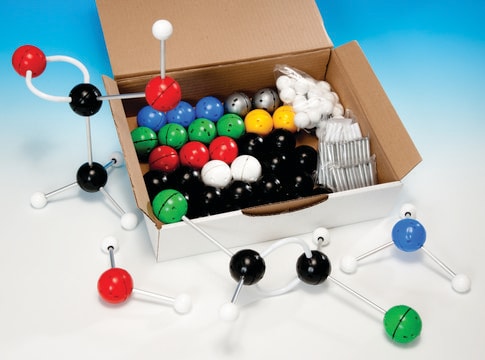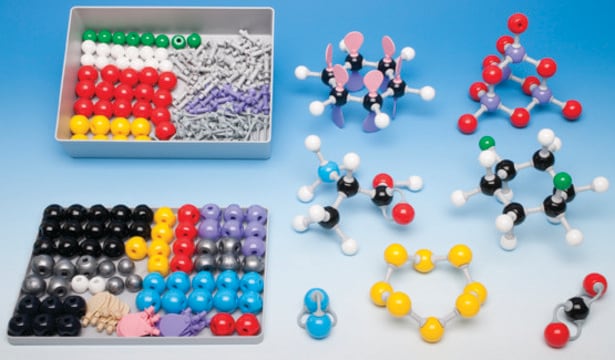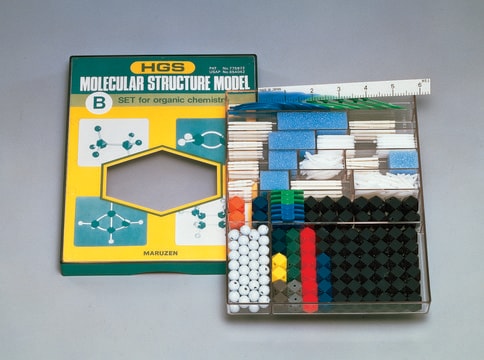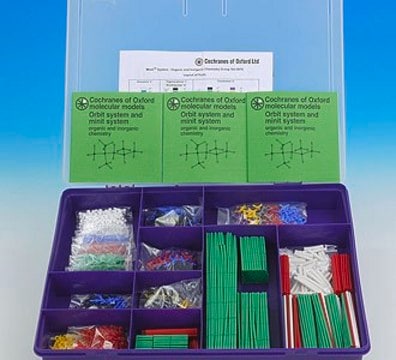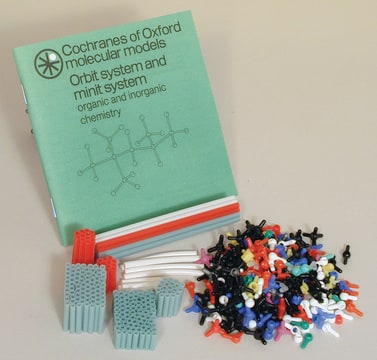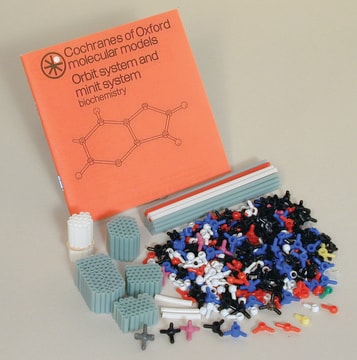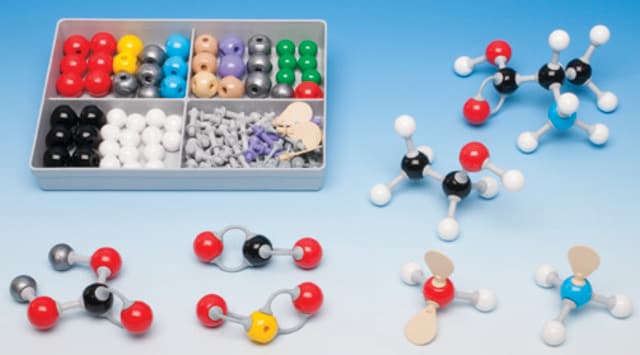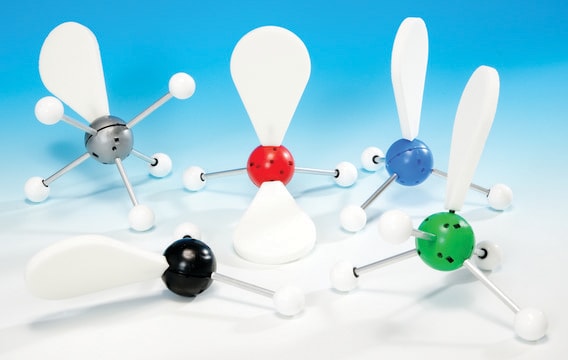Z119636
Cochranes molecular models
orbit, large set
Sinónimos:
chemistry model sets, molecular model sets
About This Item
Productos recomendados
description
Scale: 2 cm = 0.1 nanometer (1 Å), Minit 3 cm = 0.1 nanometer (1 Å), Orbit
feature
no. of atoms 1,260
no. of bonds 1,000
manufacturer/tradename
Cochranes 0041
¿Está buscando productos similares? Visita Guía de comparación de productos
General description
Please see Technical Information Bulletin AL-183 for a listing of these items, available on our website at sigma-aldrich.com
1260 atoms, 1000 bonds, 4 booklets
Premium compartmented storage boxes.
Scale: 3 cm = 0.1 nanometer (1 A), Orbit
ATOMS:
- 1-prong: Hydrogen, white (250), Nitrogen, blue (10), Oxygen, red (50), Fluorine, light green (10), Sulfur, yellow (10), Chlorine, green (10), Bromine, dark green (10), Iodine, dark green (10)
- 2-prong linear: Hydrogen, white (40), Carbon, black (5), Nitrogen, blue (5), Oxygen, red (20)
- 2-prong 100°: Sulfur, yellow (10)
- 2-prong 110°: Nitrogen, blue (10), Oxygen, red (120)
- 2-prong 120°: Nitrogen, blue (10)
- 3-prong 100°, 130°, 130°: Carbon, brown (3), Phosphorous, purple (10)
- 3-prong 108°, 120°, 132°: Carbon, black (20)
- 3-prong 108°, 126°, 126°: Carbon, black (20), Nitrogen, blue (20), Oxygen, red (10)
- 3-prong 114°, 123°, 123°: Carbon, black (20), Nitrogen, blue (20)
- 3-prong 120°: Carbon, black (100), Nitrogen, blue (50), Oxygen, red (20)
- 4-prong tetrahedral: Carbon, black (110), Nitrogen, blue (10), Oxygen, red (20), Phosphorous, purple (20), Sulfur, yellow (12), Halogen, green (30), Metal, silver (30)
- 6-prong octahedral: Carbon, black (6), Nitrogen, blue (4), Oxygen, red (14), Sulfur, yellow (5), Iron, grey (12), Halogen, green (20), Metal, silver (20)
- 5-prong trigonal bipyramid: Carbon, black (6), Nitrogen, blue (4), Oxygen, red (4), Phosphorous, purple (2)
- 8-prong cubic: Halogen, green (5), Metal, silver (20)
- 12-prong: Metal, silver (40)
- X pegs (30)
BONDS:
- Extra-thick, light grey, 5 cm (150)
- Extra-thick, light grey, 3.5 cm (250)
- Extra-thick, light grey, 3 cm (150)
- Extra-thick, light grey, 2 cm (200)
- Extra-rigid, grey, 3.5 cm (45)
- Rigid white, 5 cm (60)
- Rigid white, 3.5 cm (90)
- Rigid mixed, 21 cm (48)
- Very flexible white, 21 cm (6)
- Very flexible white, 5 cm (6)
Elija entre una de las versiones más recientes:
Certificados de análisis (COA)
Lo sentimos, en este momento no disponemos de COAs para este producto en línea.
Si necesita más asistencia, póngase en contacto con Atención al cliente
¿Ya tiene este producto?
Encuentre la documentación para los productos que ha comprado recientemente en la Biblioteca de documentos.
Los clientes también vieron
Artículos
Use our handy VSEPR chart to find the 3-D geometric VSEPR shapes of molecules and ions and learn about VSEPR theory and shapes.
Use our handy VSEPR chart to find the 3-D geometric VSEPR shapes of molecules and ions and learn about VSEPR theory and shapes.
Use our handy VSEPR chart to find the 3-D geometric VSEPR shapes of molecules and ions and learn about VSEPR theory and shapes.
Use our handy VSEPR chart to find the 3-D geometric VSEPR shapes of molecules and ions and learn about VSEPR theory and shapes.
Nuestro equipo de científicos tiene experiencia en todas las áreas de investigación: Ciencias de la vida, Ciencia de los materiales, Síntesis química, Cromatografía, Analítica y muchas otras.
Póngase en contacto con el Servicio técnico